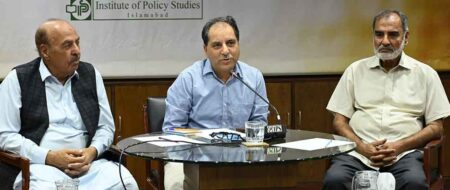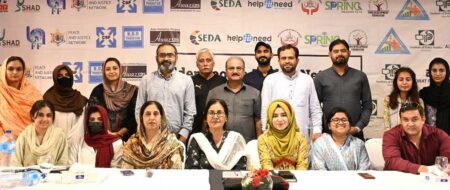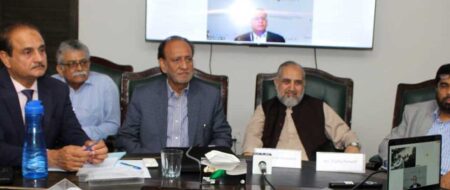Pakistan’s role exemplary for a world free of chemical warfare
The seminar titled “Chemical Weapons Convention and Pakistan” was organized by the Institute of Policy Studies on 28 February 2013
Security experts, diplomats and analysts in a seminar observed that efforts should be made to promote and augment Pakistan’s exemplary role vis-à-vis the Chemical Weapons Convention (CWC) and with respect to its efforts for a world free of chemical warfare.
The seminar titled “Chemical Weapons Convention and Pakistan” was organized by the Institute of Policy Studies on 28 February 2013 and was attended by a number of security experts, diplomats, researchers and officials of concerned organizations.
A comprehensive overview of the history and various issues pertaining to CWC was given by Lt. Colonel Azfar Bilal, director of the National Authority for CWC and Disarmament Coordination which was followed by an interactive discussion among the seminar participants which was moderated by Commander (Retd) Azhar Ahmad, a senior IPS associate.
The seminar participants viewed India’s entering into CWC in June 1997 as a possessor state of chemical weapons, declaring it had a dedicated CW program, as a nasty breach of bilateral trust and violation of diplomatic norms, as in 1992 Pakistan and India had signed a Joint Declaration on the Complete Prohibition of CWs undertaking not to develop, produce, acquire or use these weapons. Both countries signed the CWC in 1993.
The main speaker, Azfar Bilal informed the audience that Pakistan had joined the CWC as non-possessor of chemical weapons and has since then been actively involved in supporting the cause of global disarmament as part of its overall security policy. It has been member of the Executive Council of the Organization for Prohibition of Chemical Weapons (OPCW) since 1998 and coordinator of its Asian Group since 2004. Domestically, Pakistan has established a national authority under CWC Implementation Ordinance, 2000 and has established a comprehensive regime with all relevant stakeholders on board. The National Authority engages with chemical producing companies, traders, chemists and researchers and was working to enhance the capacity and awareness against CWs through courses, workshops, seminars and mock exercises.
“Meeting all the requirement and obligations under the Convention, Pakistan regularly submits its annual report and facilitates routine inspections of OPCW”, he informed.
Giving an overview of CWC he informed that 188 countries, representing 98 per cent of the world population, have signed and ratified the convention, whereas two countries that have signed but not ratified it so far were Israel and Myanmar. Angola, North Korea, Egypt, Somalia, Syria and South Sudan were countries that have neither signed the treaty nor ratified it. The six countries that joined CWC as chemical weapons possessor states were USA, Russia, India, South Korea, Albania, and Libya.
He further informed that the convention required state parties to destroy hundred per cent of their chemical weapons by 29 April 2007, however, the deadline was extended up to 2012 but not met mainly by USA and Russia. On expiry of the due date, new deadlines of 2017 for Russia and 2023 for USA have been accepted.
Khalid Rahman, DG-IPS, in his concluding remarks said that it was a matter of great pride for the whole nation that Pakistan’s excellent conduct vis-à-vis CWC has been acknowledged and appreciated at all relevant international forums and it has also been selected as a mentor state for other developing nations. In the war of narratives this fact need to be consistently highlighted at all levels to defeat the propaganda from hostile quarters, most of which has been conflicting, fragmentary and spread with malicious intent.
“Pakistan needs to remain steadfast in its commitment to CWC yet develop comprehensive safety and security measures in case of any accident or emergency”, he stressed.












